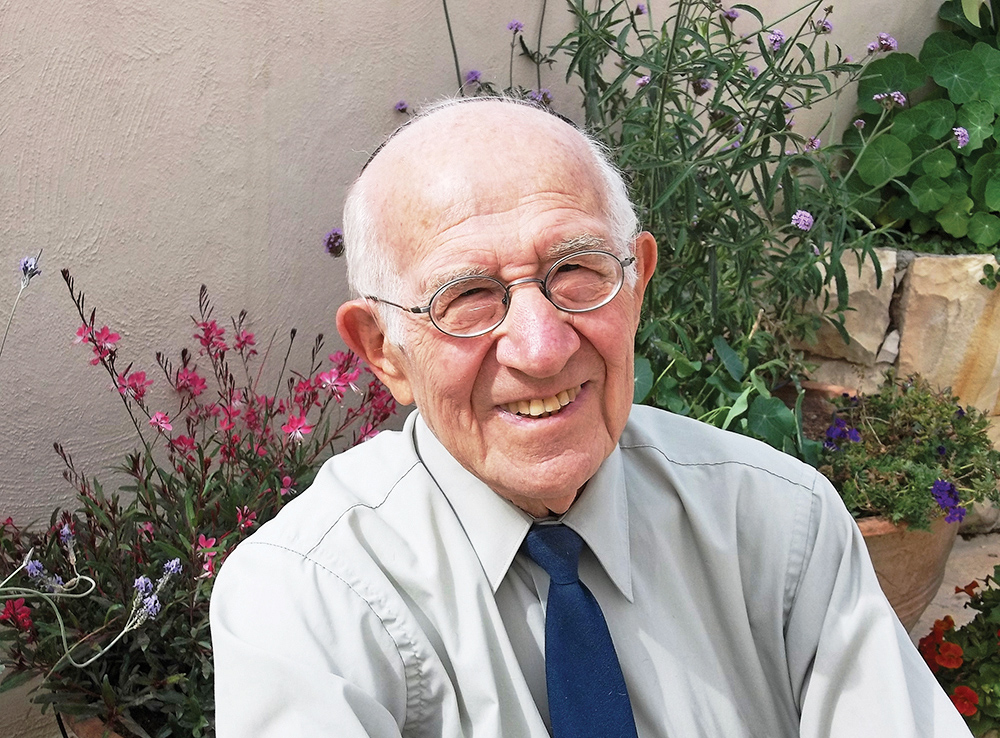Ninety-seven-year-old Zecharia Dor-Shav has multiple professional titles to his name. He is a rabbi, professor, educator, psychologist and author. Titles aside, he has dedicated his career to empowering his students to realize their potential and contribute their unique skills to their respective fields of study. Born in Williamsburg, he has spent the past five decades living in Israel and making his mark on the fields of psychology, education and Jewish studies.
Dor-Shav received his doctorate in education and psychology from New York University, and his semicha from the Rabbinical Seminary of America. While he was working as a professor in the Education Department at Long Island University, he received an offer for a position at Israel’s Bar Ilan University. It was a dream for Dor-Shav to be able to live in Israel and continue his teaching. It took him and his wife two years until they were able to sell their house. In 1969, they boarded a boat with 200 other immigrants, and 18 days later they arrived on the shores of Israel.
At Bar Ilan, Dor-Shav combined the fields of psychology, Judaism and education, placing emphasis on understanding his students and helping them forge a life path. His research focused on cognitive processes and cultural differences, Jewish self-identity, Judaism, psychology and modern science, and the development of empathy, particularly as it relates to Holocaust survivors. He published dozens of scholarly articles in academic journals and lectured at international conferences. During his tenure at Bar Ilan University, he served as the director of the Eliezer Stern Institute for Research and Advancement in Religious Education and as chairman of the School of Education.
As an educator, Dor-Shav saw his role as crucial to building the next generation of Israelis who are committed to knowledge and learning. Throughout his career, he encountered many students from underprivileged backgrounds, and encouraged them to perceive their own greatness and follow the path they envision for themselves. One poignant meeting was with a son of Moroccan immigrants, who expressed deep gratitude for his advanced level of education with Dor-Shav, despite the fact that his own mother could neither read nor write and, in his childhood, would send him to school barefoot. The student would eventually become a supervisor in the north of Israel, overseeing the education of many Israeli youth. The student exclaimed, “Who would imagine that a barefoot boy whose mother does not know how to read and write can write a seminar paper in college?”
Beyond the subject matter he taught, Dor-Shav inspired his students to challenge conventional thinking. He shared an incident when he met with students who were facing a particular issue, and he challenged them to think about an alternative method to deal with the struggle. One of the pupils offered a solution, but insisted that the principal would not allow him to make that change. Nonetheless, Dor-Shav encouraged him to approach the principal with his solution and to state his belief that this proposed method was worth a try. Indeed, the principal listened to the student and agreed to make a change.
He also taught classes for aspiring educators in all high school subject matters. He would remind them that regardless of the specific subject matter they were conveying, they were—in Dor-Shav’s own words—“advancing God’s goals on earth” by pursuing a career in education. He encouraged them to convey to their students that they are irreplaceable, and that nobody can fill their shoes. A student must be empowered to use his or her special talents, abilities and interests to further their mission on earth, he would say.
Dor-Shav draws his educational philosophy from Jewish sources. “As a Jewish people we are 12 tribes. Every tribe is different. Each one has its own special talent, but what unites us is the fact that we are all around the Mishkan,” he said. “That’s precisely what God wants, that every human being recognizes his or her own unique and special gift that can contribute to the Jewish people’s sojourn on earth. It’s the task of each individual to precisely find that and do so.”
Last year, Dor-Shav published a book titled “Dershowitz Family Saga: A Century and a Half of Jewish Life in Poland, Through America, and Into Israel.” (Dor-Shav changed his last name from Dershowitz after his aliyah.) The book traces significant events in modern Jewish history through his own family’s journey from Europe to America and Israel. His family includes his father, Leibish, who with his friend Binyamin Wilhelm established Yeshiva Torah Vodaath; and his grandfather Zecharia, who established the first Hasidic synagogue in Williamsburg. Alan Dershowitz, the renowned civil liberties lawyer and Israel advocate, is one of his nephews.
Though formally retired from teaching, Dor-Shav is not done spreading his knowledge. He studies Talmud every day and stays informed of developments in the world of science. He is working on a commentary on Aggadah, or the non-legalistic material of the Talmud, which he hopes to publish soon. He also keeps busy spending time with his children, grandchildren and great-grandchildren.
“Once a student asked me, ‘What more is there for me to do? Other giants have already built a mountain,’” Dor-Shav recalled. He responded, “You can put a pea on top of the mountain, and so the mountain is higher because of the green pea that you put on top.” This anecdote sums up the nonagenarian’s philosophy on life that he has instilled in so many of his students: that we, too, can contribute to this world in some significant way.
Alisa Bodner is a Fair Lawn native who immigrated to Israel a decade ago. She is a nonprofit management professional who enjoys writing in her free time.











